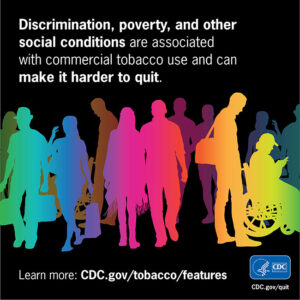A CDC feature article
Health equity is the fair and just opportunity for all people to be as healthy as possible, and that includes the opportunity to be free from commercial* tobacco. Yet, some people don’t have this opportunity because of factors like their race or ethnicity, where they live, or what kind of job they have.
For decades, tobacco companies have used promotions, targeted marketing, and other tactics to unfairly increase access to and appeal of tobacco products for certain population groups. Discrimination, poverty, and other social conditions have also been linked to tobacco product use and can make it harder to quit. These factors are linked to high levels of disease, disability, and death from tobacco use in some populations—like Hispanic and Latino people and people with behavioral health conditions.
More protections are needed to prevent tobacco product use and secondhand smoke exposure among different population groups, and to help people who use tobacco to quit for good. Everyone deserves to be as healthy as they can be, and that means living free from the harmful effects of commercial tobacco. By increasing efforts in these areas, we can advance health equity.
Social Determinants of Health and Their Relationship to Health Behaviors
 Social determinants of health are conditions in the places where people live, learn, work, and play that affect health and quality of life. Examples of social determinants of health related to tobacco include retail conditions like the number of stores that sell tobacco in a neighborhood and where in stores tobacco products are displayed and advertised.
Social determinants of health are conditions in the places where people live, learn, work, and play that affect health and quality of life. Examples of social determinants of health related to tobacco include retail conditions like the number of stores that sell tobacco in a neighborhood and where in stores tobacco products are displayed and advertised.
Education, job opportunities, and income are other social determinants of health that can influence how healthy a person can be. For example, lower quality education can be associated with less ability to understand and act on health information and less access to good jobs with health insurance. People with lower incomes can have less access to healthcare, including care needed for smoking-related health conditions.
Some social determinants of health can lead to stress, which can also affect people’s tobacco product use. Stress from financial problems, discrimination, or unsafe neighborhoods can make it harder to quit smoking and can even increase tobacco product use. When people have severe or long-lasting forms of stress, their bodies can respond by raising stress hormones and keeping them raised. If this goes on for a long time, they may develop health problems such as high blood pressure or type 2 diabetes.
